by Cheryl Eagan-Donovan
This year’s 21st annual Independent Film Festival Boston brought together audience favorites and award winners from Sundance, SXSW, and other top festivals, with local filmmaker premieres, and as always provided an opportunity to mix and mingle with talented producers, directors, crew, actors, and film aficionados. Curated by industry veterans Nancy Campbell and Bryan Tamm, the selection of films was representative of the best of this year’s indie fare.
Opening night featured GHOSTLIGHT, directed by Kelly O’Sullivan and Alex Thompson and reimagining Shakespeare’s Romeo and Juliet as a community theater production that provides catharsis for a construction worker mourning the loss of his son.
The film premiered at Sundance, was picked up by IFC Films, and will have its theatrical release on June 14th. Although the screening was not sold out, likely because the film has not generated the same buzz as other selections like SING SING and I SAW THE TV GLOW, there was an enthusiastic crowd at the Somerville Theater for the first night of the festival. The performances are solid but the plot is somewhat contrived. When the son’s cause of death and the basis of the family’s lawsuit are finally revealed, it feels both too convenient and inauthentic. Mirroring the plot of Romeo and Juliet, the son and his girlfriend make a suicide pact to escape their impending forced separation, but the girlfriend survives. Her attempts to apologize to the family and share in their grief are barely acknowledged and never resolved. The father’s journey to self-awareness and empowerment through the theater is the real story here, but it fails to reach its potential, bogged down by family dynamics that are one-dimensional if at times amusing. An Australian film that screened at SXSW, AUDREY, explores the same premise basic premise of theater vs. family but with much more humor and pathos.
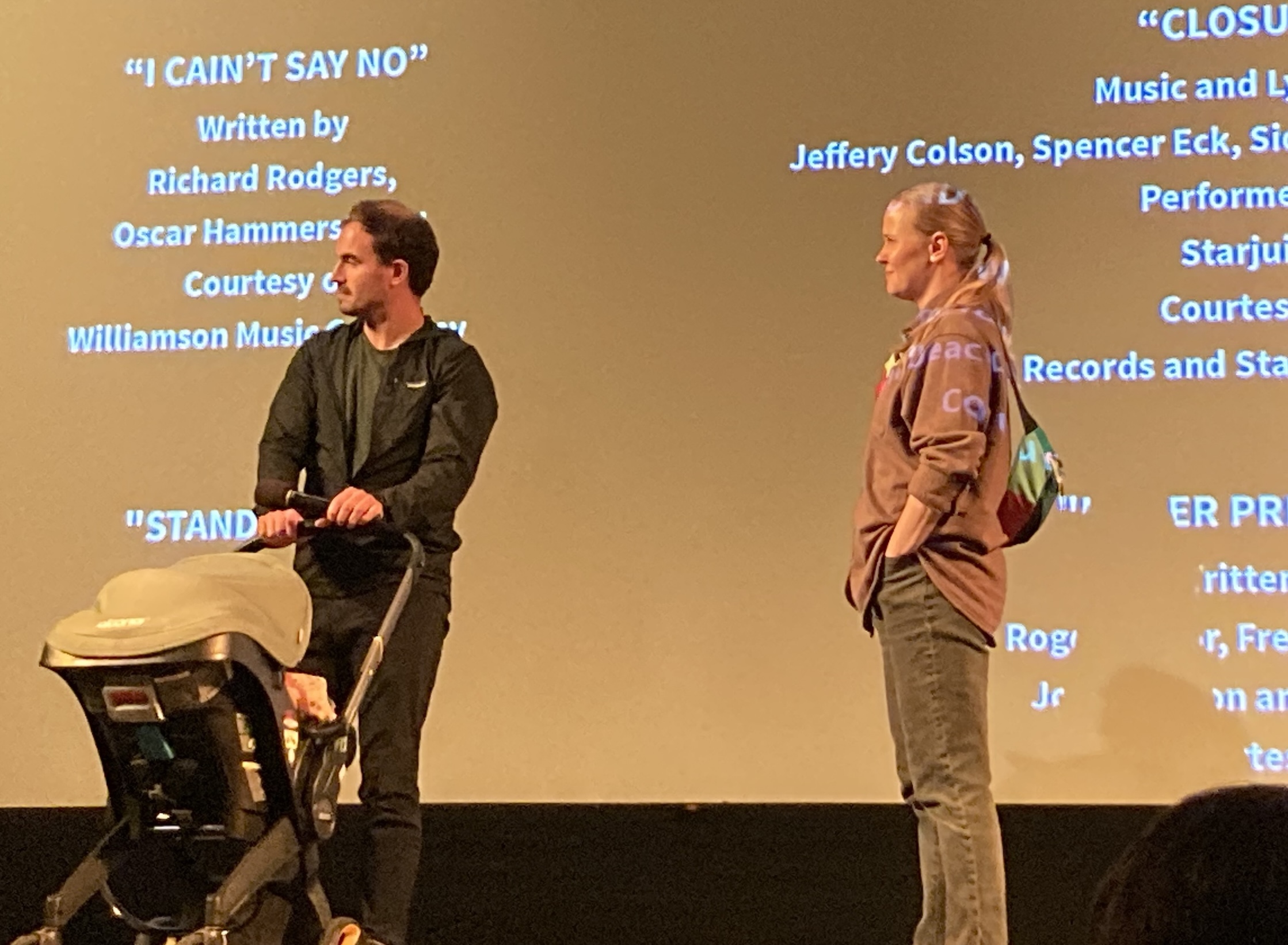
Writer and director O’Sullivan, appearing with her son and co-director Thompson, talked about the genesis for the film at the Q&A session, explaining that it was inspired by a National Theatre production of Romeo and Juliet she viewed during the pandemic that prompted her to think about the power of community theater. She said she used to hate Shakespeare until she discovered award-winning actor Mark Rylance, whose delivery of the words made the work accessible. At a recent event I attended at the New York Public Library, Rylance talked about his own discovery of the power of Shakespeare’s words as an actor; he has clearly mastered the art of interpreting the canon. O’Sullivan revealed that many of the actors knew each other from the Chicago theater scene, and this was apparent in their on-screen interactions. She also talked about the way they shot the last scene in the film from three different perspectives to give the audience the experience of being on stage as well as in the wings and out front. Lovers of Shakespeare and theater will find something to connect with in GHOSTLIGHT.
The opening party at the Crystal Ballroom was well attended by local filmmakers and Chlotrudis Film Society members, including Michael Colford, Vicki Oleskey, Brett Reliford, Chris Kriofske, and Beth Curran. Michael also serves on the board of the Provincetown Film Society so we talked about their upcoming festival.
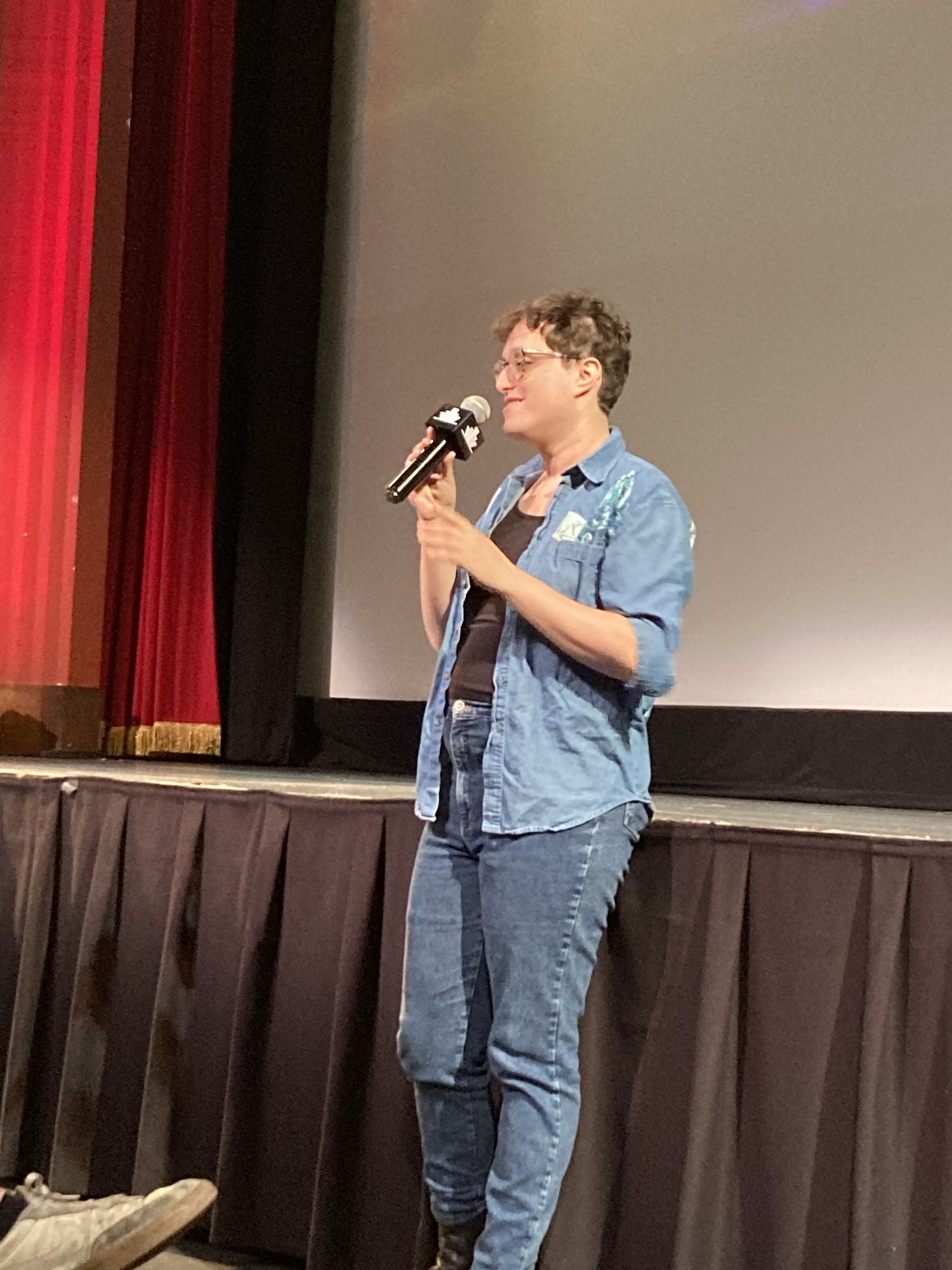
The second night of the festival included the Boston area premiere of I SAW THE TV GLOW at the Brattle Theater. Due to a scheduling conflict, I was not able to attend this screening, but I did see it at the Coolidge Corner Theater a week later, where director Jane Schoenbrun received the 2nd Annual Coolidge Breakthrough Artist Award. Another film that premiered at Sundance, I SAW THE TV GLOW captures the unique experience of queer teen angst, media as alternate reality, and gender dysphoria in the very specific late 1990s with a singular vision and great cinematic flair. Schoenrun has created a film that reaches beyond its intended trans audience in expressing the existential dread of not being yourself in the face of the relentless passage of time. The use of the horror genre as a template for the experience of bring trapped, lost, and reborn is extremely effective in delivering the director’s message, deftly mixing the supernatural with the bleak realities of suburban high school and family life. Standout performances by Justice Smith, Danielle Deadwyler, and Brigette Lundy-Paine carry the script and engage the viewer. Clearly worthy of the awards and accolades received to date, Schoenbrun’s work is at once reminiscent of Jordan’s Peele’s early films and yet refreshingly original, in some ways without precedent. In an interview with Gregg Araki for Filmmaker Magazine, they reflect on their own experience and the optimism inherent in simply recognizing the true self as one of the film’s mantras. At the awards event at the Coolidge, they charmed the audience with stories of working in a movie theater and frank revelations like the fact that they had been married prior to transitioning. Their previous feature, WE ARE ALL GOING TO THE WORLD’S FAIR, played at IFFBoston a few years ago, proving once again that our local festival programmers are adept at choosing directors who are destined for greatness.
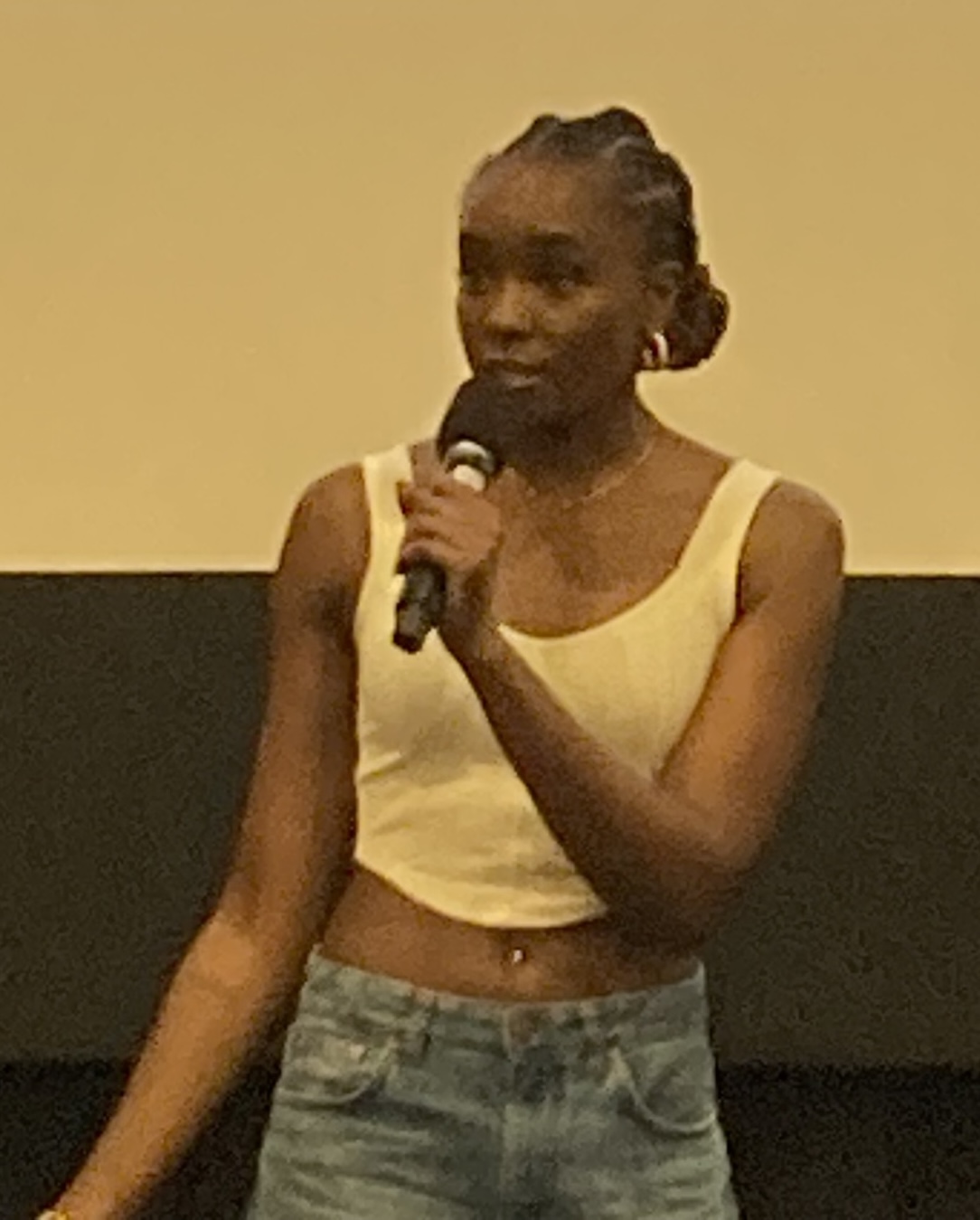
I saw DANDELION at the Somerville Theatre on Thursday. Directed by Nicole Riegel and starring KiKi Layne (IF BEALE STREET COULD TALK), the film sounded promising: a 40-year-old struggling singer/songwriter named Dandelion enters a contest at a biker rally where she hopes to finally break out and be recognized. Instead she meets Scottish boy wonder Casey, another singer/songwriter from the indie folk scene and the two embark on a brief collaboration and romance. It seems that the director simply wanted to shoot in South Dakota, as the film is filled to the brim with excruciatingly long shots of the Badlands and its great motorcycle touring roads, and a complete lack of understanding of the biker community. That a single woman without any friends at the event would sleep alone in her car is completely unrealistic; the entire premise defies the suspension of disbelief. The scenes where the protagonist writes her own songs are painfully dull, and the ones where the couple compose together equally bland and boring, including excessively long close-ups. The entire films comes across as a vehicle for the songwriting Dessner brothers (founders of the popular band The Nationals) to showcase their work, although Layne says she worked with them to rewrite the songs to fit both her style and her world view. She has a great voice and is a very talented actress but deserves a better opportunity to further develop her potential on screen. The protagonist’s ailing mother is a just another plot device, whose character is one-dimensional, first berating her daughter as a failed artist, then embracing and encouraging her ambitions in an unbelievable sudden change of heart. None of the characters are fully developed, with Casey, the love interest, most lacking in back story and depth. Predictable from the outset, the film ends with the guy being a cad and the songwriter finding success on her own terms at long last. Nothing in the script feels earned. But Layne was truly enthusiastic and engaging at the Q&A, where because the director bailed at the last minute, she had to work with the WBUR reporter who showed up expecting to interview Riegel. She explained how when she read the script she immediately connected with the story, having grown up in Cincinnati where the film is set, and having always aspired to be a singer/songwriter herself. She also talked about the magic of filming in the wilds of South Dakota, including experiencing silence on a whole new level, in the midst of something so vast, and the joys of filming in her hometown, surrounded by friends and family. Lastly, she revealed that the real challenge of shooting on film vs. digital was not concern about money – she said “Nicole let it roll” – but trusting that the shots were working without having the luxury of instant playback. Riegel’s first feature HOLLER (2021) earned her “director to watch” status and several awards but this sophomore effort is a disappointment despite its premiere at SXSW, the strengths of its star, and the many laurels of the executive producing Dessners, who also hail from Cincinnati. A film about the music scene in that city would have been much more interesting.
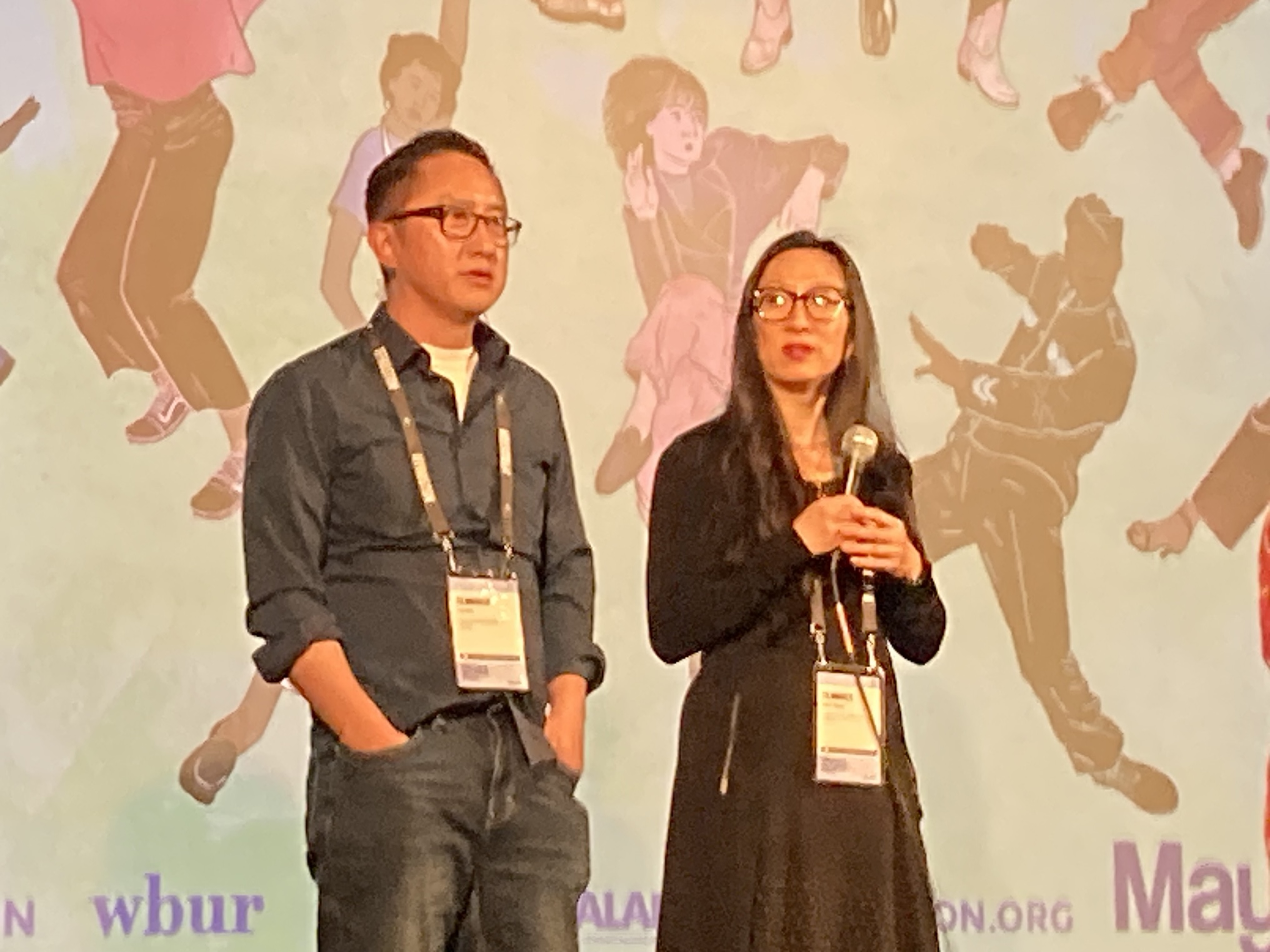
On Friday, day three of the festival, we headed to the Brattle in Harvard Square for two films. ADMISSIONS GRANTED was co-sponsored by the Boston Asian American Film Festival and proved to be a thought-provoking look at the lawsuit initiated by students against Harvard University for discrimination in the admissions process. A comprehensive documentary examination of the different players, from students protesting in support of affirmative action to notorious attorney Edward Blum, his conservative supporters, and parents of the Asian American students directly impacted by a system that includes a “personal” ranking that is clearly biased. I met the director Miao Wang outside the theater before the screen where Eric Masunaga of Modulus Studios introduced me to her. Eric did post on both of my films and has lent his expertise to many award winning local and national productions, including lots of PBS films and programs. Exploring a complex issue with the journalistic objectivity and professional integrity of a Frontline series film, ADMISSIONS GRANTED will make its broadcast premiere on MSNBC on June 30th. Perhaps a little too long for TV at 90 minutes, it provides nuanced and in-depth portraits of the players, with an especially fascinating look at political operative Blum that reveals exactly how the right is winning the war against democracy in the this country. In the end, all of the students are the victims of a preference-based structure and its failures, but the two rejected Harvard applicants who initiated the lawsuit have gone on to thrive at other institutions and perhaps learned a little bit about the limitations of the legal system. The Q&A was dominated by two law professors, one from Harvard and the other from Tufts, which was unfortunate because although it focused on the intricacies of the issue and the future of affirmative action in the United States, it did so at the expense of hearing more from the filmmakers Wang and Hao Wu about the process and their work. An important film from two accomplished directors.
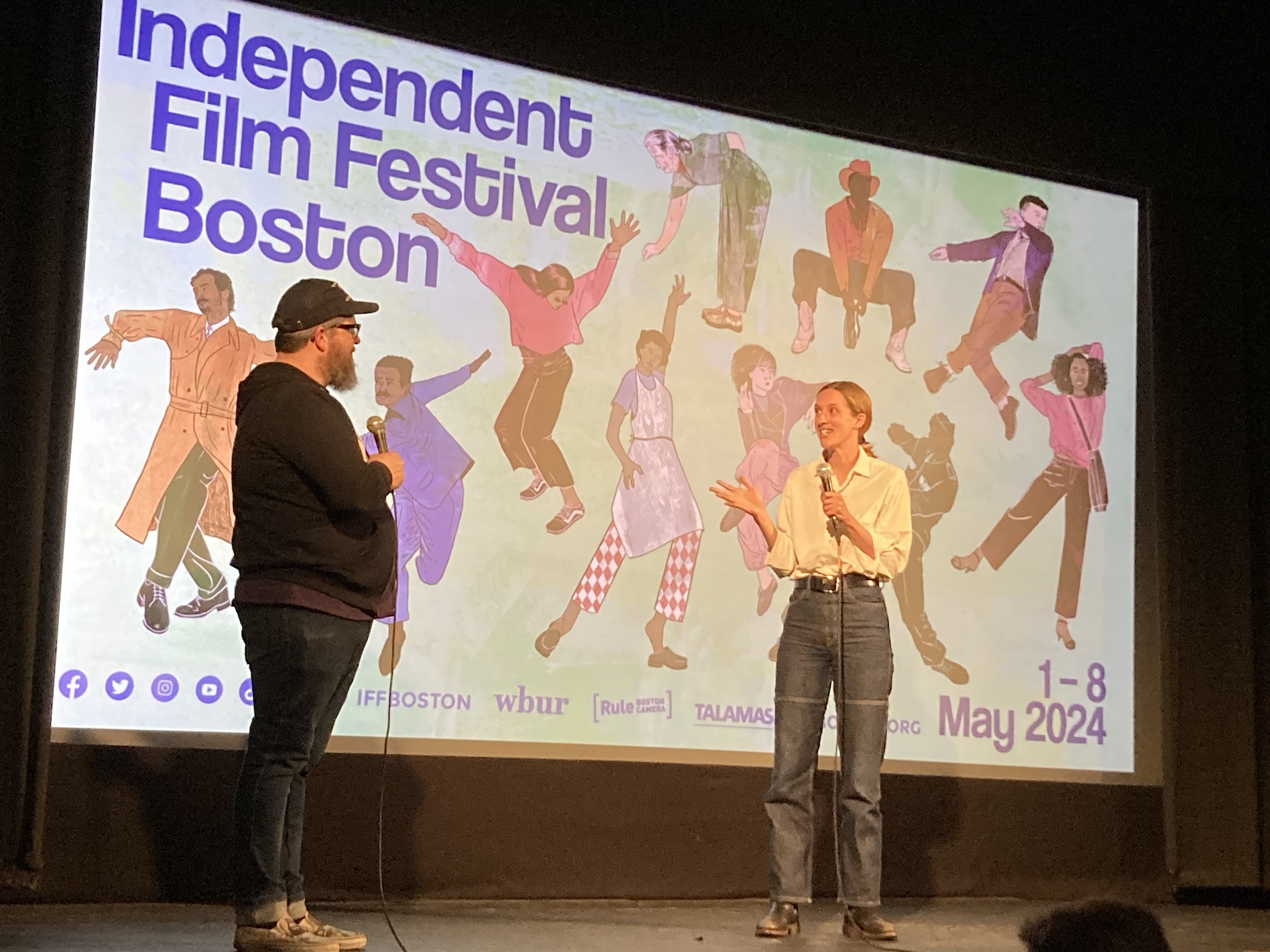
Next up at the Brattle on Friday night was the narrative film GOOD ONE, winner of the Grand Jury Prize for dramatic feature at Sundance, and Best Narrative Feature at IFFBoston. Written and directed by India Donaldson and featuring a breakout performance by Lily Collias as main character Sam, the film is a poignant meditation on the relationship between a father and daughter set against the backdrop of the upstate New York wilderness. Director Donaldson drew on her own experience going on camping trips with her father to craft a script that allows Collias the space to embody the character in a way that feels fresh and genuine. The conflict created by her dad’s hapless best friend is subtle but realistic, culminating in an inappropriate advance, which is all but ignored by her father; he casually dismisses her concern like a typical clueless adult. This is the beauty of the film; it captures the trip from protagonist’s Sam’s perspective. Like many of the festival making the festival circuit this year, GOOD ONE was conceived during COVID, when the idea of shooting on a 300-acre property in the Catskills seemed too good to be true. But the location allowed the cast and crew to make the most of the situation, taking advantage of the ability to capture spontaneous moments in nature, which lend another layer of authenticity to the story. The viewer is immersed in the world, along for the hike. The director talked about the chemistry of the crew as one of the keys to the production’s success. Referring to her relationship with cinematographer Wilson Cameron, she quipped, “How do you shoot a film in 12 days? Work together for 10 years first.” Her work has paid off. The film is now at Cannes, where it is nominated for a Golden Camera Award and the Director’s Fortnight Award.
After the screening we decided to skip the pizza party back in Davis Square and have drinks and appetizers at Longfellow’s next door to the Brattle. This was a great chance to catch up with producer Vicki Oleskey, who screens films for several festivals and had just returned from the Sarasota Film Festival. We made plans to meet again at the Brattle on Saturday afternoon.
I had hoped to see RICHLAND produced by local film guru Sarah Archambault, which premiered at Tribeca, but scheduling conflicts once again intervened and so I started day four with the documentary THE REMARKABLE LIFE OF IBELIN. Like so many of the films at this year’s festival, this film premiered at Sundance where it won both the Directing Award and the Audience Award for Best Documentary, World Cinema. Norwegian director Benjamin Ree deftly uses home movies and a recreated online game world to tell the story of Mats Steen, a young man whose life was cut short by a rare terminal form of Muscular Dystrophy. When he died at age 25, his parents discovered that their son, using the name Ibelin for his avatar, was a real life hero to his many friends in the World of Warcraft community. We are immersed in his world through the beautifully rendered recreation of his character’s journey in the online universe, as he finds love, friendship, conflict, and meaning in his own life as a member of the Starlight gaming group. The film is emotional and moving. I was struck suddenly by the true power of the simple act of running through the story world for Mats, who in real life was confined to a wheelchair. When he finally reveals that he has Duchene’s to his online girlfriend, she is devastated by the fact that he does not want to meet in person. The last scenes in which his friends attend his funeral are both heartbreaking and triumphant, and the coda is that every year, the Starlight community honors Mats as the role model he embodied. IBELIN allowed me to see, for the first time, the importance of virtual gaming community, especially in the context of today’s epidemic of loneliness among young people.
Saturday night brought out the biggest crowd at the Somerville Theater for the world premiere of the documentary THE ROAD TO RUANE, the story of local legend rock impresario Billy Ruane. His generosity and his unpredictable behavior, his manic dancing and pure, unrelenting joie de vivre touched so many people in the music world and beyond. The film is a fitting tribute to a brilliant and tortured soul. His vast knowledge of jazz and rock, his trust fund, and his love of discovering new music allowed him to create a scene at a little restaurant in Central Square, The Middle East, that soon became known around the world as the place to see upcoming new bands. Club owners Joseph and Nabil Sater welcomed his booking talents, and looked out for him when his bipolar disorder began to interfere with his ability to look after himself. Director and editor Scott Evans does an excellent job of putting together the myriad pieces of Billy’s wild and chaotic life, and in the process pays tribute to his filmmaking partner Mike Gill, who worked on the project for years, collecting the interviews and archival materials, and then died suddenly in February 2022 at the age of 45. He too was loved and revered by the music community, as well as being an accomplished filmmaker.
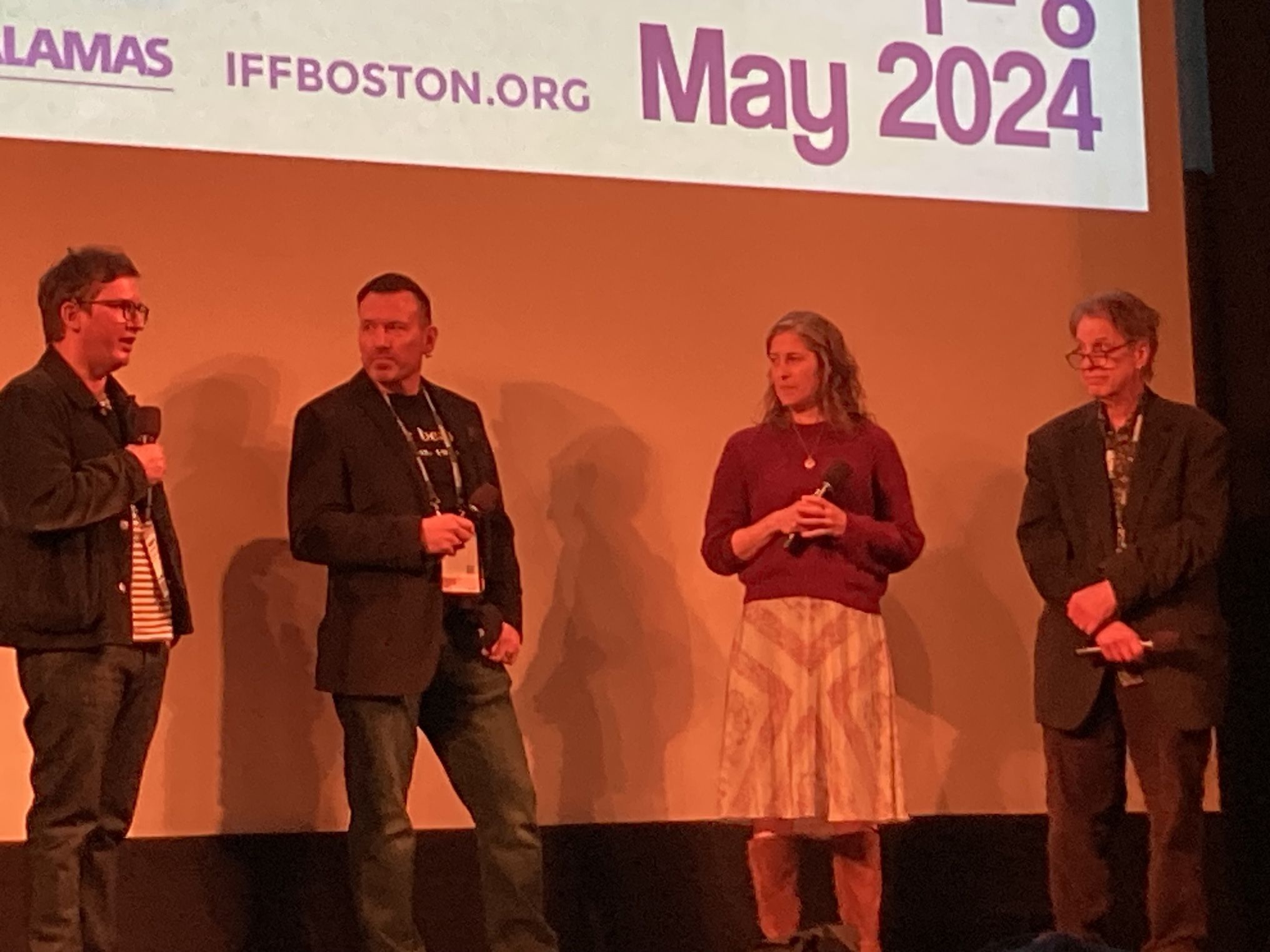
I knew Billy well from my work as a band manager in the early 1990s, and even encountered his notorious wrath at one point when he jokingly pretended to strangle me over a show I was booking at the Middle East. But I did not know that he had lost his mother to suicide, a trauma that, according to his stepsister, remained unacknowledged, and clearly haunted him throughout his short life. The fact that Ruane’s mother’s death may have been intentionally exploited by Woody Allen in his film INTERIORS was another revelation, perhaps not surprising given what we now know about Allen, but still disturbing. It was a shock to the entire music community when Ruane was found dead in his apartment at age 52 in 2010. His friend Pat McGrath reflected the collective loss felt by many in the audience to this day when in the Q&A he said how much he wished Billy could have been here to see the film and revel in his own legacy. Director Evans also acknowledged the contributions of Lili Ruane, Billy’s sister, who appears in he film but sadly passed from pancreatic cancer in February this year,

just prior to the film’s completion: a reminder to live every day to the fullest, like Billy did, in spite of everything. Winner of the Karen Shmeer Award for Excellence in Documentary Editing.
Saturday night’s karaoke party at The Crystal Ballroom was great fun as usual, especially when Boston hardcore rock legend “Springer” sang “Billy Don’t Be a Hero” dedicated to Ruane. Another highlight was a rendition of Lou Reed’s “Take a Walk on the Wild” also in memory of Billy. Chlotrudis Society member Julie Blu came ready to dance.
On Sunday night, we went to see HAPPY CAMPERS, a documentary portrait of a beachside community in Chincoteague, Virginia. Mixing verite footage and informal interviews with residents, director Amy Nicholson gives viewers a first-hand look at the people who summer on the small strip of oceanfront property known as Inlet View, and the way in which their close-knit relationships have turned a trailer park into what they see as paradise. Their inexpensive campers and makeshift sheds are filled with laughter, food, drink, and celebrations every summer, providing a respite from the real world in what these working class families lovingly call their beach houses. The director embedded herself in the community by living there for three years, getting to know the renters, and filming everything herself, which lends the film an immediacy and authenticity but also precludes objectivity. She clearly loves the place and like the other vacationers, hated to see the landowners sell the property to a developer who would destroy their piece of seaside heaven, only to replace it not with high-rise condominiums but simply with new, more expensive luxury trailers. To add insult to injury, they never offered the current renters a chance to buy in to the “new and improved” properties. At the Q&A, Nicholson talked about the fact that funders wanted her to focus on the political views of her mostly blue collar subjects but she insisted that her film was not about the divisive nature of the 2020 election, the year in which the film was shot. In the end, she did receive funding from Creative Capital, and the film went on to premiere at the DOC NYC festival. An intimate film that preserves a little slice of American life.
Next we opted to see a few documentary shorts. The Doc Short Gloucester Program included two artist profiles, a nostalgic film about the TV show TRL and a film about NASA that included some amazing footage. THE ART OF METAPHOR tells the story of New York installation artist Donna Dennis, the buildings she constructs and her recent displacement from a Tribeca artists’ loft. ITS NOT UP TO US introduces audiences to Nancy Burson, another New York artist, who helped pioneer facial aging and morphing technology with engineers at MIT, and continues to produce visual work that she believes is guided by a force beyond the stars. At just thirteen minutes, it is difficult to get a grasp on exactly how Burson developed her theories of extraterrestrial intervention in her work, but it’s a fascinating glimpse nonetheless of an artist who explores the medium of quantum entanglement on canvases, and states unequivocally, “There is no free will.” Space Coast captures the experience of waiting for the launch of Artemis-1 at Cape Canaveral from the perspectives of NASA enthusiasts, astronauts, and engineers with insightful details and spectacular imagery. It explores the current crisis and the challenges facing the government-funded agency. TR(OL)L by first-time director Yourgo Artsitas explore the 1999 viewer-based email campaign to make New Kids On The Block’s then 10-year old music video for the song “Hanging Tough” number one on the daily teen MTV show Total Request Live. A look back at the early days online pranksters that pays homage to the time period and its irreverent adolescent Internet pioneers.
Monday would be my last day of the festival so I went all in for a marathon of films at the Brattle, starting with POWER, a Netflix film directed by Yance Ford, who although unable to attend in person, implored the audience to discuss post screening. An in-depth look at the origins of policing in the United States and its recent rapid militarization, this film was harrowing in its presentation of the facts and figures as well as difficult-to-watch archival footage. The relationship between slave catchers, union breakers, the colonization of indigenous Americans, and anti-immigration policies, and the development of police forces in cities throughout the United States is documented and linked to today’s reality: 18 million individual officers licensed to kill, accountable only to their own local departments. Even though I consider myself well aware of the unchecked power of American police forces and the unrelenting push to equip them with wartime weapons and ever-increasing funds, in spite of recent calls to defund them, the statistics were extremely disturbing. Interviews with current and former Black American officers lend complexity to the dilemma. The filmmaker chronicles the astronomical amounts of money allocated by every presidents over the last 40 years, regardless of their party-affiliation, and reminds us that we are rapidly moving toward becoming a police state. Like so many others, this film had a Sundance premiere. Not to be missed, streaming on Netflix now.
The narrative feature DIDI, co-presented by the Boston Asian American Film Festival, was a charming, if at times heart wrenching, coming of age drama. The title character, Taiwanese-American Didi, at the awkward age of thirteen desperately wants to fit in with friends at school but every attempt he makes seems to backfire. The Brattle audience expressed their empathy with throughout the screening as they watched him battle his mother, his older sister, a potential girlfriend, and even his so-called best friends in an ongoing struggle to figure who he is and where he belongs. Director Sean Wang’s first feature took home two awards at Sundance: the U.S. Dramatic Jury award for Best Ensemble Cast and the Audience Award. The cast really is outstanding, especially Izaac Wang as Didi and Joan Chen as his mother, and Sean Wang is definitely a new director to watch with an authentic voice and a fresh vision. Opening in theaters in the U.S. July 26th.
My last film of the evening was SEBASTIAN, a meta-meditation on the art and craft of writing and sex work as a vehicle for inspiration and identity. A successful gay freelance journalist working for major London publications decides to do research for his first novel about young men who view their sex work with male clients as pure entrepreneurship without any stigma. Demand for his services soon begins to interfere with his ability to turn in assignments on time, leads to his losing an important interview and ultimately getting fired. With more time to devote to first person research, SebastiAn meets men who each help shape his own self-awareness, even as he shamelessly transcribes the experiences for new chapters in the novel. Things get complicated when he develops an ongoing relationship with an older client, whom he credits with teaching him about gay history when trying to explain the sudden shift in the novel to his agent, who objects to the romantic angle and wants what he promised: just more anonymous sex without consequences. He acquiesces briefly but then gets caught blatantly embellishing an encounter with another regular, who throws him out and leaves him stranded in Brussel. Of course he is rescued by his client turned friend and mentor Nicholas, and ultimately triumphs when his novel, completed based on his actual experiences and written in the first person, is lauded by his peers in the London literary scene. Another Sundance selection, this second feature from director Mikko Makela co-presented by the Boston Wicked Queer festival, includes strong performances by Ruaridh Mollica as protagonist Max and veteran actor Jonathan Hyde as his protector Nicholas. The film will be distributed in the U.S. by Kino Lorber. Write what you know!
Once again, conflicts in my schedule meant that I missed SING SING starring Coleman Domingo on Tuesday night and the closing night feature THELMA on Wednesday, both audience favorites and award-winners playing at the Coolidge, but I’m happy to report that both films are also playing the Provincetown International Film Festival in June, where I am headed next with a few fellow Chlotrudis members.
Once again, Nancy and Bryan and their team of enthusiastic volunteers gave us an excellent line up of the best films from the 2024 national festival circuit to date, along with a sold out world premiere with a local connection, and a host of parties for celebrating and networking. Seven days of great films at three great art house venues: who could ask for anything more?
